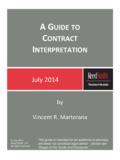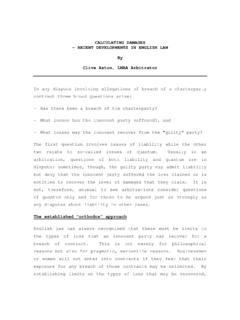Transcription of Brexit Briefing: Impact on Contracts and Choice of Law
1 1 Brexit briefing : Impact on Contracts and Choice of Law Type: Legal Guide Law Firm: Kirkland & Ellis International LLP Published: February 2017 Keywords: Brexit , Contracts , Choice of Law T his document provides general information and comments on the subject matter covered and i s not a comprehensive treatment of the subject. It is not intended to provide legal advice. With respect to the subject matter, viewers should not rely on this information, but seek specific legal advice before taking any legal action. Any opinions expressed in this document are those of the author and do not necessarily reflect the position and/or opinions of A4ID.
2 Advocates for International Development 2017 3 Brexit briefing : Impact on Contracts and Choice of Law Overview Brexit may affect the operation of your existing Contracts and the terms on which you may choose to contract in the future. T his article discusses: some practical steps you can take in relation to existing Contracts and points to consider if Brexit makes a contract more difficult to perform; how you can try to future-proof new Contracts for Brexit ; how contractual references to the EU and EU law are likely to be impacted by Brexit ; and the likely effect of Brexit on Contracts that are subject to english law or the english courts.
3 Definitive advice will ultimately depend on the nature of the UK s relationship with the EU post- Brexit , whether as a member of the EEA (like Norway), with a negotiated bilateral agreement with the EU (like Switzerland) o r (at the other end of the spectrum) based on the WT O Model. Executive Summary Review your existing Contracts to determine whether Brexit could make these Contracts difficult to perform or less profitable In new Contracts , consider using Brexit clauses to future-proof new Contracts Once the new relationship between the UK and the EU becomes clearer, seek specialist advice for Contracts regulated by EU-level regulation Brexit should not Impact your Choice of english governing law How Brexit will Impact the enforcement of english judgments in the EU will depend on the UK/EU relationship; in the meantime, consider using arbitration 4 1.
4 What steps can you take now? We are currently in wait and see mode regarding the detailed legal ramifi ca ti on s of Brexit . One step you can take now, however, is to conduct an assessment of your existing contract profile and contract counterparty profile ( determine whether you h a ve a lot of EU distribution agreements, or material Contracts involving areas of law that rely heavily on EU level legislation, such as business to consumer Contracts , or multiple supply Contracts with EU counterparties that may need to be enforced in the future). T he next practical step is to identify any particularly high value, high risk, long-term or otherwise strategically important Contracts , thinking in particular about the business issues that could make that contract less profitable or loss-making or more difficult to perform for either party ( due to increased trade barriers, exchange rate exposure, customs checks, restrictions on the freedom of movement of people, etc.)
5 Post- Brexit . 2. What if an existing contract becomes unprofitable or more difficult to perform? It is unlikely that your existing Contracts will allow you to renegotiate or terminate a contract that has become more difficult to perform as a result of Brexit in the absence of express provisions to this effect ( if a contract was entered into when Brexit was contemplated). It is also unlikely that a standard force majeure clause (typically included in Contracts to allow parties to suspend or terminate their obligations under a contract as a result of circumstances out of their control, due to the occurrence of a natural disaster or an act of terrorism or war) could be interpreted to be triggered by Brexit .
6 T hey are normally limited to obligations rendered impossible to perfo rm and (for more recent Contracts ) will not usually encompass events which could reasonably have been foreseen. Where a serious event occurs which is unexpected and not addressed in a force majeure clause and is beyond the control of the parties to the contract , a contract may become frustrated , thereby freeing the parties from their obligations under i t. However, frustration is very difficult to establish and this concept would be expected to apply only if Brexit is deemed to radically alter the essence of the obligations under a contract , not merely because Brexit results in inconvenience or financial difficulties, and therefore it is unlikely to provide you with a way out of such Contracts .
7 5 3. How can you future-proof new Contracts ? For new Contracts (or those which are coming up for renewal before the end of th e two year negotiating window once Article 50 is triggered), you should consider how to deal with future difficulties in performing your Contracts in light of Brexit . One solution might be to include a specific Brexit clause ( giving you the right to renegotiate or terminate), which would be triggered by a specific Brexit -related event. Of course, some of your counterparties may seek to do the same. Similarly, if a contract is particularly exposed to exchange rate volatility ( as to pricing or invoicing) you should consider including clauses to re-price or switch currency, renegotiate the terms of the contract or even terminate it.
8 4. Will Contracts covering the EU include the UK after Brexit ? Many Contracts (such as distribution agreements, joint venture agreements, franchise and licence agreements) contain territorial provisions. For existing Contracts , for example, whether references to the EU will include the UK after Brexit depends on the specific drafting and wider commercial context of the contract . You could future-proof against this uncertainty by expressly stating whether (or not) the UK is intended to be included within the territory after Brexit . 5. How will contract obligations derived from EU laws apply after Brexit ?
9 T he UK Government has recently announced its intention to repeal the Eu ro p e a n Communities Act 1972, with immediate effect on Brexit . T his means that all directly applicable EU legislation ( EU Regulations and Treaties, which become instantly applicable in EU Member States once they have been passed in Brussels) will cease to have effect in the UK on that date. However, the Government s current intention is simultaneously to bring that legislation onto the UK s statute book, in order to avoid any immediate legal black holes . There are no current plans to repeal existing UK legislation which previously implemented numerous EU Directives into UK law.
10 This is intended as a stop gap . The Government s stated intention is that all UK legislation of EU-origin will eventually be reviewed and a policy decision taken as to whether to retain, modify or repeal it. T he practical result is that the substance of english law is unlikely to change significantly in the immediate (or even medium-term) aftermath of Brexit . Whether express references to EU law in existing Contracts will be interpreted to include (or exclude) successor UK legislation under the Great Repeal Bill is likely to depend on the specific drafting and the wider commercial context of the contract . For new Contracts , it is possible to deal with the position expressly, although it is unclear for now what the successor legislation will look like.










